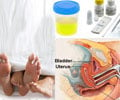One In Nine Young Women Diagnosed With Chlamydia Infection
Chlamydia infections could be the culprit for infertility in women according to a recent research study. Alarmingly, screening programme has found that one in nine young people are infected with the microorganism. It is feared that the number of cases in 16-24 year-olds may be far higher.
The number of young women tested positive for the disease has in fact increased by a margin of three times over the past three years. Chlamydia is the most commonly diagnosed STI in men and young men. The fact that more young people tend to have multiple sexual partners could account of the epidemic.The sexually transmitted disease can cause infertility in women but is often diagnosed late as only few symptoms are manifested in a majority of the cases. It is rightly referred to as ‘silent infection’ as nearly up to 70 per cent of people who are asymptomatic can still pass on the disease to others.
The infection can affect the uterus and fallopian tubes, leading to infertility and chronic pain if left untreated. A massive, free screening programme is being launched to help combat the spread of the disease and is being targeted at women aged between 16- 24. A confidential screening service would be provided as part of a DoH-funded pilot initiative to make it easier for young people to be screened for chlamydia.
Speaking at the NCSP conference in central London, Public Health Minister Caroline Flint said: "We are making both screening and testing services more accessible for the under-25s, offering them in places outside traditional health care settings such as universities, pharmacies and armed forces bases."
The programme is being extended to all other parts of England and is aimed at offering a full coverage by 2007. In the first year of the National Chlamydia Screening programme (NCSP), launched in 2003, around 18,000 people were screened and in the second year more than 60,698 were tested for the sexually transmitted disease.
In short community participation is the key to the success of such massive campaigns directed towards diagnosis and prevention of sexually transmitted diseases.








